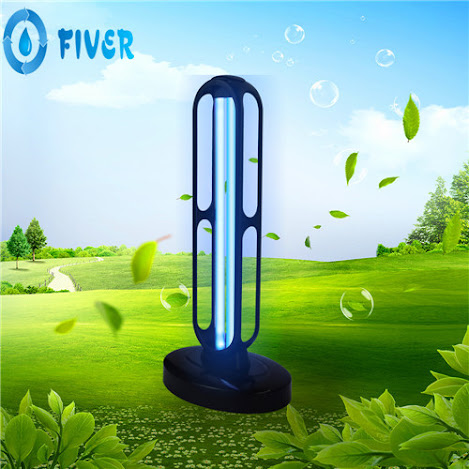Hospital UV Light Disinfection: Many Uses with Big Benefits
Most of us know that UV light can kill viruses and
bacteria with germicidal properties, but do you know how it works and the many
benefits of hospital UV light disinfection? Ultraviolet (UV) light is
electromagnetic radiation emitted in various wavelengths, either UVA, UVB or
UVC, with short-wave UVC having the most powerful, germ-killing properties. UVC
light emitted at 254 nanometer (nm) is proven to destroy harmful pathogens and
microorganisms with high efficacy.
Disinfection
in hospitals has always been of great concern, although recent events with
hospitals across the country reaching near capacity makes cleanliness and
disinfection even more important. Hospital acquired infections (HAIs) are
infections that occur within 48 hours of hospital admission, within three days
after discharge or up to 30 days following an operation. The Center for
Disease Control, CDC, estimates that 1 in 31 patients in U.S. hospitals
contract an HAI, many caused by serious antibiotic resistant bacteria that may
lead to sepsis or death.
Challenges
of Disinfecting Hospitals
Hospitals provide life-saving miracles every day,
they are also a place where numerous contagious viruses and bacteria could be
lurking in patient rooms, waiting rooms and hallways. Manual cleaning in
hospitals is often not enough to eliminate harmful pathogens with acceptable
effectiveness. Decontamination of patient rooms prior to subsequent admissions
is critical for many reasons:
·
The patient who left the room could
have had a serious, contagious infection
·
The patient entering the room is
already ill and may have a compromised immune system
·
Hospital staff move from room to room
and have the potential to transmit pathogens
Many factors play a role in the effectiveness of
manual cleaning, such as the human factor. Some reasons why manual cleaning
does not provide enough protection include:
·
Human error, a person can simply
‘miss a spot’ when cleaning
·
Insufficient contact times with
cleaners
·
Diluted disinfectant solutions
·
Use of contaminated cleaning cloths
spreading disease
·
Outsourced cleaning staff proven less
effective than hospital personnel
According
to a report by the National Institutes of Health, Evaluation of an
Ultraviolet C (UVC) Light-Emitting Device for Disinfection of High Touch
Surfaces in Hospital Critical Areas, many studies demonstrate that current
cleaning strategies in hospital rooms are inadequate and 50% or more of
hospital surfaces may go untouched and uncleaned after a manual disinfection.
Manual cleaning is plagued with random variations such as the improper use of
cleaning cloths and solutions that can spread harmful pathogens.
How
Does UVC Light Disinfect?
UVC
light is replicated in UVC Germicidal
Lamps, designed and engineered to emit the
precise wavelength necessary for disinfection. UV Lamp Manufacturers
like Light Sources are expert UV lamp manufacturers in designing UV lamps to
obtain the perfect germicidal emissions necessary. Fivergroup is producing
lamps emit UV electromagnetic radiation at 185 nm, and are effective in certain
water and air applications and also eliminate foul door and volatile organic
compounds (VOCs) from the air.
UVC radiation quickly penetrates the DNA of harmful
bacteria and virus cells and alters the DNA so they no longer are capable of
replicating. A virus cell that cannot replicate is considered dead and
harmless. UVC light is proven to eliminate a wide range of viruses and bacteria
including superbugs like MERS, SARS, vancomycin-resistant Enterococcus (VRE),
C. Difficile, and many others.
Where
Can Hospitals Use UV Light?
UVC
germicidal lamps are used in a wide range of germicidal systems such as UV
air purification systems, UV water treatment systems and surface sterilization applications.
UV light in hospitals can be used in many sterilization systems to disinfect:
·
Air –
UV air treatment systems include HVAC UV air purification systems where UV
lamps purify the air as it passes through the central ventilation system. Air
sterilization is also possible from upper room ultraviolet germicidal
irradiation, UVGI, systems.
·
Water –
UV water treatment systems eliminate harmful microorganisms in water supplies.
·
Surfaces –
UV sterilization lamps can be used over countertops in patient rooms and over
surgical tables in operating rooms. UVC robots can roam through patient rooms,
operating rooms, hallways, and bathrooms to disinfect all surfaces and even
hard to reach places.
·
Food –
food irradiation is another way that hospitals can prevent the spread of
disease by preventing foodborne illnesses such as E. coli and Salmonella. UV
light sterilization systems provide many benefits in restaurants and cafeterias
and could be especially useful in hospital kitchens and eating areas.
There
are numerous ways that hospitals and many other public places can help to
prevent the spread of harmful diseases by utilizing Germicidal UV lamps.
UV light sterilization systems can be found in airports, libraries, schools,
retail, commercial, industrial, restaurants, cafeterias and many other
establishments.
Benefits
of Hospital UV Light Sterilization Systems
Hospitals aimed at improving infection control
strategies can realize significant benefits by utilizing UV light sterilization
systems in addition to their current cleaning practices. UV light disinfects
24/7, helping hospitals to maintain a clean and safe environment without
putting added strain on hospital staff. UV sterilization systems require
high-quality UVC germicidal lamps designed for their specific application.
In
Conclusion:
fivergroup.com is global industry
leaders in UV lamp manufacturing, providing a wide range of UVC germicidal
lamps for any disinfection application. Our lighting engineers possess deep
technical knowledge of UV radiation, engineering custom designed lamp features
to meet your specifications with custom phosphor blends available. Contact us
with any questions and to find the perfect UV lamps for your hospital UV light
sterilization system. Browse our website about UV Lamp Supplier for more
details.




Comments
Post a Comment